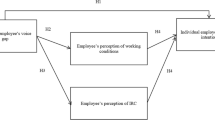Abstract
Enterprise Information Systems (IS) have been widely applied to improve enterprise performance in the digital era. Users’ behavior is the key for IS success. However, extant research on IS users’ behavior has focused on the in-role behaviors such as IS adoption and usage, while the IS voice behavior which belongs to the extra-role behaviors has been paid little attention to. Employees’ voice is one of the sources of enterprise innovation, and is important for IS success. To fill the research gap and provide several implications for enterprise IS practice, this paper analyzes the antecedents of enterprise IS users’ voice behavior. Based on the work of behavior theory, hypotheses are proposed. Regression is conducted to test the hypotheses with the samples of 187 enterprise IS users by a survey. The results show that organizational innovation climate, positive emotion, perceived ease of use, and extroversion personality have significant positive effects on enterprise IS users’ voice behavior.
Access this chapter
Tax calculation will be finalised at checkout
Purchases are for personal use only
Similar content being viewed by others
References
Huang, M.: Peng, Jie: IS user behavior: theoretical research progress and analysis framework. J. Intell. 37(3), 178–181 (2018). (In Chinese)
Wang, N., Li, Q., Ni, D., Ge, S., Su, X.: Effects of IT system usage on job performance: an empirical study. Manage. Rev. 29(6), 141–151 (2017). (In Chinese)
Huang, M., Xiao, J., Xie, K.: Emotion, discretionary behavior, and IT effectiveness. Int. J. Multimedia Ubiquit. Eng. 9(5), 307–316 (2014)
Huang, M., Peng, J., Wang, C.: The effects of users’ organizational citizenship behaviors on information system performance. In: The 2017 4th International Conference on Systems and Informatics (ICSAI 2017), Hangzhou (2017)
Morrison, E.W.: Employee voice behavior: integration and directions for future research. Acad. Manage. Ann. 5(1), 373–412 (2011)
Xu, L., Zhao, S., Zhang, M.: Impact of abusive supervision on employee voice behavior: a study of the mediating role of the dualistic work passion. Chin. J. Manage. 15(10), 988–995 (2018). (In Chinese)
Jing, X.: The impact of organizational justice on voice behavior-The moderating effect of organizational support. Res. Financ. Econ. Issues 394(9), 101–106 (2016). (In Chinese)
Duan, J., Wang, Z., Zhong, J.: A research on the impact of big five and perceived organizational justice on voice behavior. Psychol. Sci. 30(1), 19–22 (2007). (In Chinese)
Fu, Q., Duan, J., Tian, X.: The emotion mechanism o f employee voice behavior: a new exploratory perspective. Adv. Psychol. Sci. 20(2), 274–282 (2012). (In Chinese)
Huang, M., Li, E.Y., Wong, C.-S.: A multilevel model of information system success in the user department: integrating job performance theory and field theory. Int. J. Inf. Syst. Change Manage. 7(4), 286–307 (2015)
Law, K.S., Wong, C.-S., Huang, G.-H., Li, X.: The effects of emotional intelligence on job performance and life satisfaction for the research and development scientists in China. Asia Pac. J. Manage. 25(1), 51–69 (2008)
McClelland, D.C.: Testing for competence rather than for “intelligence”. Am. Psychol. 28(1), 1–14 (1973)
Campbell, J.P.: Modeling the performance prediction problem in industrial and organizational psychology. In: Dunnette, M.D., Hough, L.M. (eds.) Handbook of Industrial and Organizational Psychology. Consulting Psychologists (1990)
Blumberg, M., Pringle, C.C.: The missing opportunity in organizational research: some implications for a theory of work performance. Acad. Manage. Rev. 7(4), 560–569 (1982)
Gu, Y., Peng, J.: The effect of organizational creative climate on employees’ creative behavior: the moderating effect of creative self-efficacy. Nankai Bus. Rev. 13(1), 30–41 (2010). (In Chinese)
Ashkanasy, N.M., Daus, C.S.: Emotion in the workplace: the new challenge for managers. Acad. Manage. Rev. 6(1), 76–86 (2002)
Li, X., Hsieh, J.J.P.-A., Rai, A.: Motivational differences across post-acceptance information system usage behaviors: an investigation in the business intelligence systems context. Inf. Syst. Res. 24(3), 659–682 (2013)
Crant, J.M., Kim, T.-Y., Wang, J.: Dispositional antecedents of demonstration and usefulness of voice behavior. J. Bus. Psychol. 26(3), 285–297 (2011)
LePine, J.A.: Voice and cooperative behavior as contrasting forms of contextual performance: evidence of differential relationships with big five personality characteristics and cognitive ability. J. Appl. Psychol. 86(2), 326–336 (2001)
Li, J., Yang, Z.: The effect of extroverted personality on voice behavior: the cross-level moderating effect of authoritarian leadership. Acad. Bimestrie 6, 129–134 (2017). (In Chinese)
Song, B.-X., Wang, Y.: The mechanism of organizational innovation climate on IS innovative use. Jinan J. (Philos. Soc. Sci.) 5, 59–67 (2014). (In Chinese)
Beaudry, A., Pinsonneault, A.: The other side of acceptance: studying the direct and indirect effects of emotions on information technology use. MIS Q. 34(4), 689–710 (2010)
Chen, L.: Research on the Impact of Leader’s Big-Five Personality on Firm Growth. Zhejiang University, Hanzhou (2015). (In Chinese)
Farh, J.-L., Earley, P.C., Lin, S.-C.: Impetus for action: a cultural analysis of justice and organizational citizenship behavior in Chinese society. Adm. Sci. Q. 42(3), 421–444 (1997)
Huang, M., Bhattacherjee, A., Wong, C.-S.: Gatekeepers’ innovative use of IT: an absorptive capacity model at the unit level. Inf. Manage. 55(2), 235–244 (2018)
Funding
This work was supported by the Special Fund for Science and Technology Innovation Strategy of Guangdong Province (Special Fund for “Climbing Plan”). The grant number is ppdjh2020b0251.
Author information
Authors and Affiliations
Corresponding author
Editor information
Editors and Affiliations
Rights and permissions
Copyright information
© 2021 The Editor(s) (if applicable) and The Author(s), under exclusive license to Springer Nature Singapore Pte Ltd.
About this paper
Cite this paper
Huang, M., Li, C. (2021). Empirical Research on the Antecedents of Enterprise IS Users’ Voice Behavior Based on the Work Behavior Theory. In: WU, C.H., PATNAIK, S., POPENTIU VLÃDICESCU, F., NAKAMATSU, K. (eds) Recent Developments in Intelligent Computing, Communication and Devices. ICCD 2019. Advances in Intelligent Systems and Computing, vol 1185. Springer, Singapore. https://doi.org/10.1007/978-981-15-5887-0_9
Download citation
DOI: https://doi.org/10.1007/978-981-15-5887-0_9
Published:
Publisher Name: Springer, Singapore
Print ISBN: 978-981-15-5886-3
Online ISBN: 978-981-15-5887-0
eBook Packages: Intelligent Technologies and RoboticsIntelligent Technologies and Robotics (R0)




